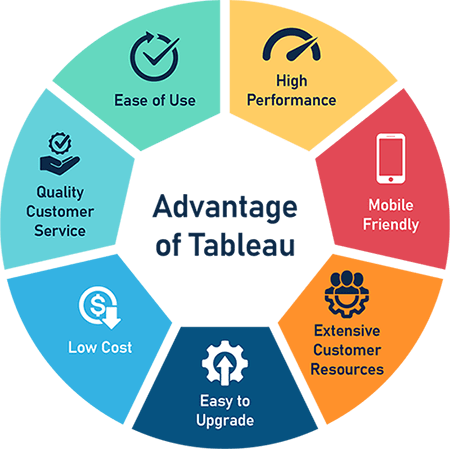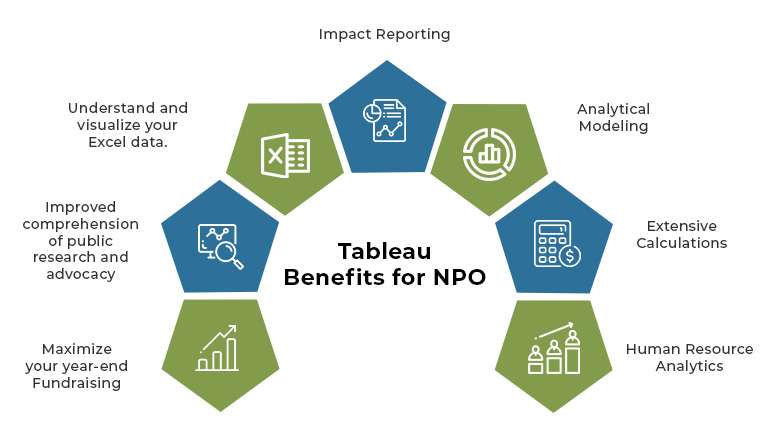
- Introduction
- What is Tableau?
- Why Learn Tableau in Future
- Top Career Opportunities for Tableau Professionals
- Salary Prospects for Tableau Professionals
- How to Start a Career in Tableau
- Conclusion
Introduction
Tableau, a leading data visualization tool, has opened up a wide range of career opportunities in today’s data-driven world. As businesses increasingly rely on data to inform decision-making, the demand for professionals skilled in transforming raw data into actionable insights has surged. Tableau enables users to create interactive dashboards, compelling visual reports, and real-time analytics, making it an essential tool across industries such as finance, healthcare, marketing, retail, and technology. Career paths include roles like Tableau Developer, Data Analyst, Business Intelligence Analyst, Data Scientist, and Tableau Consultant. These positions require a mix of analytical thinking, storytelling through visuals, and technical proficiency. Tableau professionals, often equipped with Business Analyst Training, work closely with stakeholders to interpret data, identify trends, and present findings that drive strategic business decisions. With its user-friendly interface and powerful capabilities, Tableau is accessible to both technical and non-technical users, broadening its career appeal. Certifications offered by Tableau further enhance job prospects by validating expertise. The growing emphasis on data literacy ensures that Tableau skills remain in high demand, offering stable and rewarding career prospects. Whether you’re entering the data field or looking to specialize in analytics, Tableau provides a strong foundation and numerous pathways for growth and advancement in the ever-expanding data industry.
Do You Want to Learn More About Business Analyst? Get Info From Our Business Analyst Training Today!
What is Tableau?
- User-Friendly Interface: Tableau offers a drag-and-drop interface, making it easy for both technical and non-technical users to create visualizations without needing to write code.
- Interactive Dashboards: It allows users to build dynamic dashboards with filters, charts, and graphs that respond to real-time data and user interaction, making it a valuable skill often featured in resources like the How to Become a Power BI Developer guide.
- Wide Data Connectivity: Tableau connects to various data sources, including Excel, SQL databases, cloud services (like Google Analytics and AWS), and big data platforms.
Tableau is a powerful data visualization and business intelligence (BI) tool that helps individuals and organizations transform raw data into interactive, easy-to-understand visual reports and dashboards. It is widely used for its ability to simplify complex data and enable quick, data-driven decision-making across various industries. Key Features of Tableau:

- Real-Time Data Analysis: Users can perform real-time analytics, which helps in tracking KPIs and making quick business decisions based on the latest data.
- Strong Community and Support: Tableau has a large, active user community and extensive online resources, making it easier to find solutions, best practices, and support.
- Scalability and Integration: Tableau scales from individual use to enterprise-wide deployments and integrates well with other tools and platforms, including Python, R, and Salesforce.
Why Learn Tableau in Future
Learning Tableau in Future offers several compelling reasons, especially as data-driven decision-making becomes even more integral to business success. As organizations continue to rely heavily on data for strategic decisions, Tableau’s ability to transform complex datasets into clear, interactive visualizations is invaluable. The demand for professionals skilled in tools like Tableau is increasing across industries such as finance, healthcare, technology, and retail, making it a highly marketable skill. Tableau’s user-friendly, drag-and-drop interface ensures that both technical and non-technical users can create powerful visualizations without needing advanced coding skills. With real-time analytics and the ability to handle a variety of data sources, Tableau when combined with Business Analyst Training provides quick, actionable insights that help businesses stay competitive. The tool’s versatility across industries makes it applicable for various job roles, including data analysts, business intelligence consultants, and Tableau developers, all of which are in high demand. Additionally, with an abundance of online tutorials, certification programs, and a strong community for support, learning Tableau has never been more accessible. In 2025, mastering Tableau positions you at the forefront of the data revolution, offering excellent career prospects and a deeper understanding of data-driven business strategies.
Would You Like to Know More About Business Analyst? Sign Up For Our Business Analyst Training Now!
Top Career Opportunities for Tableau Professionals
- Tableau Developer: Tableau Developers are responsible for designing and developing interactive dashboards, reports, and data visualizations that meet business requirements. They work closely with data teams to ensure the efficient extraction, transformation, and visualization of data.
- Data Analyst: Data Analysts use Tableau to analyze large datasets, identify trends, and create reports that help organizations make data-driven decisions. Their primary role is to provide insights and help businesses understand the story behind the data, often utilizing resources like the How to Build a Tableau KPI Dashboard to present key performance indicators effectively.
- Business Intelligence (BI) Analyst: BI Analysts leverage Tableau to create data-driven reports and dashboards that help organizations improve decision-making. They focus on analyzing business data, identifying key performance indicators (KPIs), and providing actionable insights.
As data analytics continues to be a key driver of business growth, Tableau professionals are in high demand across various industries. Tableau’s ability to transform complex data into meaningful visualizations has led to a wide range of career opportunities for individuals skilled in the tool. Here are some of the top career paths available for Tableau professionals:

- Data Scientist: Data Scientists with Tableau expertise are skilled in analyzing complex data sets and presenting their findings through advanced visualizations. They use Tableau alongside other tools and programming languages to build predictive models and help companies make informed strategic decisions.
- Tableau Consultant: Tableau Consultants work with organizations to implement and optimize Tableau solutions. They provide expertise in designing custom dashboards, training users, and ensuring that Tableau is integrated effectively within the business’s data ecosystem.
- Tableau Trainer: Tableau Trainers specialize in teaching others how to use Tableau effectively. They provide hands-on training sessions, workshops, and certification programs to help organizations upskill their teams and ensure they maximize the tool’s potential.
Salary Prospects for Tableau Professionals
The salary prospects for Tableau professionals are quite promising, reflecting the growing demand for data analytics and business intelligence skills across various industries. In 2025, the salary for a Tableau professional can vary based on experience, job role, and location, but generally, individuals with Tableau expertise enjoy competitive compensation. Entry-level Tableau positions, such as Data Analysts or Junior Tableau Developers, can expect to earn anywhere from $60,000 to $80,000 annually. As professionals gain experience and transition into mid-level roles like Tableau Developer or Business Intelligence Analyst, salaries typically range from $85,000 to $110,000. Senior professionals, including Tableau Consultants and Lead BI Analysts, can command salaries in the range of $120,000 to $150,000, or even higher, depending on the company and their skill set. Expertise in advanced visualization techniques, such as those found in the Create a Bullet Chart in Tableau tutorial, can further enhance their value in the job market. Data Scientists with Tableau expertise, who integrate advanced analytics and visualization, can see salaries ranging from $130,000 to $160,000, particularly in large tech companies or specialized industries. Location also plays a role, with Tableau professionals in major tech hubs like San Francisco, New York, and Seattle often earning more due to the higher cost of living and greater demand. With the increasing reliance on data-driven decision-making, the earning potential for Tableau professionals is expected to continue growing, offering long-term career stability and financial rewards.
Looking to Master Business Intelligence? Discover the Business Intelligence Master Program Training Course Available at ACTE Now!
How to Start a Career in Tableau
Starting a career in Tableau can be a rewarding journey, especially with the growing demand for data visualization and business intelligence professionals. The first step is to familiarize yourself with the basics of Tableau by exploring online resources, tutorials, and courses. Many platforms offer free and paid tutorials to help you understand the tool’s core features, such as connecting to data sources, creating visualizations, and building interactive dashboards. Once you have a grasp of the fundamentals, consider pursuing a Tableau certification. The Tableau Desktop Specialist certification is a great starting point, demonstrating your proficiency to employers and helping you stand out in the competitive job market. Resources like How to Become a Certified Tableau Analyst can guide you through the certification process and boost your preparation. Gaining hands-on experience is essential, so try to apply your skills to real-world datasets, either through personal projects or internships. Networking with Tableau professionals through forums, online communities, and social media can also provide valuable insights and job opportunities. Additionally, mastering other complementary skills, such as SQL and data analysis, will enhance your value in the job market. Tableau professionals can pursue roles like Data Analyst, Business Intelligence Analyst, or Tableau Developer. With dedication, continuous learning, and relevant certifications, you can successfully launch a career in Tableau and tap into numerous opportunities in the data industry.
Conclusion
Starting a career in Tableau can be a highly rewarding and strategic choice in today’s data-driven world. To begin, it’s essential to familiarize yourself with the basics of Tableau through free or paid online courses, tutorials, and hands-on practice. Understanding core features like connecting to data sources, creating visualizations, and building interactive dashboards is key. Once you’ve gained confidence in using Tableau, pursuing a Tableau certification, such as the Tableau Desktop Specialist certification, can help validate your skills and make you more attractive to potential employers. Gaining practical experience is equally important, so apply your skills to personal projects, volunteer work, or internships to build a strong portfolio. As you progress, expanding your expertise to include complementary skills like Business Analyst Training, SQL, and data analysis can give you a competitive edge. Networking with Tableau professionals through forums, online communities, and social media is also valuable for learning from others and discovering job opportunities. Tableau professionals are in demand for roles such as Data Analysts, Business Intelligence Analysts, and Tableau Developers. With continuous learning, hands-on experience, and the right certifications, you can successfully start and grow your career in Tableau, tapping into the ever-expanding field of data analytics and business intelligence.


